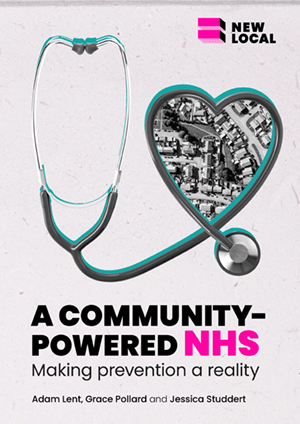 It’s been exciting in the last two years to be working with the BestMSK Health team at NHS England, and now also with MSK improvement work in Wales. There’s been lots of talk about co-production, self-management support, reducing inequalities and a focus on prevention. The direction is very much one that ARMA can support. Then I read A Community Powered NHS from New Local and I started to wonder if we are being brave enough, going far enough, thinking big enough.
It’s been exciting in the last two years to be working with the BestMSK Health team at NHS England, and now also with MSK improvement work in Wales. There’s been lots of talk about co-production, self-management support, reducing inequalities and a focus on prevention. The direction is very much one that ARMA can support. Then I read A Community Powered NHS from New Local and I started to wonder if we are being brave enough, going far enough, thinking big enough.
BestMSK Health has gone a long way down the line of including co-production, self-management support and personalised care into the plans. The culture feels different from other NHS England programmes and teams that I work with. I have been pleased to find that recent meetings with stakeholders in Wales had a similar feel.
 A lot of the principles in the New Local report are already embedded in these pieces of work: recognising individuals as active participants in their own health outcomes, understanding their context beyond their specific condition, developing a continuous improvement mindset rather than short term pilots.
A lot of the principles in the New Local report are already embedded in these pieces of work: recognising individuals as active participants in their own health outcomes, understanding their context beyond their specific condition, developing a continuous improvement mindset rather than short term pilots.
However, with the exception of peer support, it is all still very individual. Clinicians will work with individuals to understand what matters to them and identify steps they can take to better manage their own condition and identify treatment options. I think I agree with New Local when they say: “The collective, rather than the individual, plays the most significant role in successful prevention”. Are we still treating people as a collection of individuals, rather than engaging the community to exert collective power?
The new approach to NHS organisation and governance should lend itself to this approach. We could have Integrated Care Boards with communities, local government, VCSE around the table on an equal basis with clinical expertise. But will we?
 I recommend everyone who is thinking about transforming services to read, if not the full report, the blog, or listen to the podcast. There are lots of practical examples that show the recommendations are not just theory. Examples showing outcomes for patients and for the system – GPs re-gaining a manageable workload, not by introducing FCP and remote consultations, but by setting up community groups, for instance.
I recommend everyone who is thinking about transforming services to read, if not the full report, the blog, or listen to the podcast. There are lots of practical examples that show the recommendations are not just theory. Examples showing outcomes for patients and for the system – GPs re-gaining a manageable workload, not by introducing FCP and remote consultations, but by setting up community groups, for instance.
I would love to know what others in the MSK community think of these ideas. Do you know of MSK specific examples working in this way? How can we get more of this into our improvement work?

